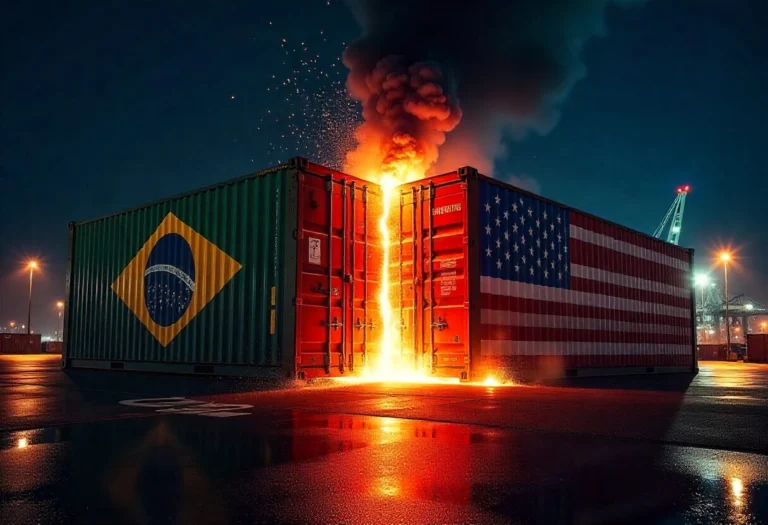Transatlantic Clash: The Tension Between Lula and Trump and the Impact of Tariffs on Brazil-U.S. Relations

July 23, 2025 Hour: 9:39 am
The bilateral relationship between Brazil and the United States, two of the most influential democracies in the Americas, has been marked by cycles of strategic cooperation and moments of sharp divergence.
Currently, the political and commercial tension between Brazilian President Luiz Inácio Lula da Silva and U.S. President Donald Trump has escalated to unprecedented levels, particularly due to the recent tariff policy pushed by Washington.
This scenario is not merely the result of personal disagreements but reflects opposing visions of the global order, sovereignty issues, and economic development models.
The current situation, marked by the imposition of a 50% tariff on Brazilian exports and the rhetorical and foreign policy responses from both governments, has significant effects not only on bilateral trade but also on both countries’ positions in the global arena.
This article analyzes the political backgrounds of Lula and Trump, examines the main points of conflict, assesses the economic and political impact of the tariff measures, and presents future prospects for this key relationship.
Brazil and the U.S.: A History of a Complex Relationship
The ties between Brazil and the United States have historically been multifaceted, encompassing strong economic links, cooperation in science and technology, and cultural and diplomatic exchanges.
However, shifts in national leadership and the international environment have continuously reshaped these bonds.
- In 2024, bilateral trade reached a volume of $80.91 billion, reflecting the maturity and robustness of the economic relationship.
- Despite China being its main trading partner, Brazil still considers the U.S. a key strategic ally.
Since Lula’s return to the presidency in 2023, Brazilian diplomacy has emphasized autonomy and multilateralism, seeking to rebalance its international presence and reduce dependence on major powers.
The Protagonists and Their Opposing Visions
Lula da Silva: Autonomy, Multilateralism, and Social Justice
Luiz Inácio Lula da Silva is a leading figure of the Latin American left, known for his focus on reducing inequality and strengthening national sovereignty.
His foreign policy has historically prioritized a multipolar world order, South-South dialogue, and reforming international institutions to ensure greater equity and representation for developing nations.
- Lula has repeatedly proposed reforms to the UN Security Council and the IMF.
- He has been critical of Washington’s unilateralism and any actions perceived as interference, firmly defending the independence of Brazilian institutions.
Donald Trump: Economic Nationalism and Protectionism
Donald Trump represents a nationalist and protectionist vision in U.S. foreign policy, encapsulated in the slogan “America First.”
During his terms, he promoted the dismantling of multilateral treaties, the imposition of tariffs, and an economic pressure strategy that prioritizes domestic interests over global cooperation.
- The Trump administration-imposed tariffs on over 180 countries, creating uncertainty in international markets.
- The U.S. has conditioned trade agreements on political alignment with its vision and has been openly critical of left-wing governments.
Points of Friction: Rhetoric, Tariffs, and Interference
The clash between these two leaderships has materialized in their public exchanges and, especially, in U.S. tariff policy.
Clash of Rhetoric and Tense Diplomacy
In recent weeks, Trump has posted messages demanding an end to legal actions against former Brazilian President Jair Bolsonaro, calling it a “witch hunt.”
Lula, in turn, responded forcefully, reaffirming that defending democracy is an exclusively Brazilian matter and that in his country, “no one is above the law.”
The Brazilian president criticized Trump’s use of social media and the absence of formal diplomatic channels, stating that “the U.S. president was elected to lead his country, not to become the world’s emperor.”
The Tariff War
In July 2025, Trump announced a 50% tariff on all imports from Brazil, justifying the measure on alleged attacks against his “ally” Bolsonaro and disputes with Brazilian courts over sanctions on U.S. tech companies.
He also threatened additional tariffs on countries aligned with BRICS, labeling their policies as anti-American.
Lula’s response was immediate: he reiterated the principle of reciprocity and the willingness to retaliate, warning that “if the U.S. imposes 50% on Brazil, Brazil will respond with equivalent measures,” if required.
Affected Economic Sectors and Immediate Impacts
Trade between Brazil and the U.S. includes a wide range of products:
- Fuels and minerals (oil, iron ore)
- Iron and steel
- Coffee, tea, yerba mate, and spices (primarily coffee)
- Aircraft and aerospace components
- Meat and other food products
- Pulp and paper, sugar, and juices (mainly orange juice)
The sectors hardest hit by the tariffs will be agriculture, livestock, and aeronautics, with companies like Embraer experiencing stock declines following the announcement.
Brazil’s National Association of Feedlot Cattlemen noted that the U.S. could not meet its beef demand without Brazilian imports, meaning American consumers would also be affected.
Additionally, the U.S. fishing and orange juice sectors, which heavily depend on Brazil, could suffer, threatening thousands of jobs.
Since the tariff announcement, the Brazilian real has depreciated by nearly 2.5% against the dollar, and the local stock market fell over 1.3%, reflecting concerns over a prolonged trade war.
Some analysts estimates that the direct effect of the tariffs could reduce Brazil’s GDP by 0.3 to 0.4 percentage points in the short term, with risks of worsening if Brazil implements broad retaliations.
Long-Term Diplomatic and Geopolitical Repercussions
This conflict goes beyond economics: Trump’s justification, centered on defending Bolsonaro, is perceived in Brazil as blatant interference in domestic affairs.
The threats, along with Trump’s public letters and social media posts, have deteriorated bilateral dialogue and eroded diplomatic trust.
- Brasilia is considering appealing to the World Trade Organization (WTO) and strengthening ties with China and the Global South as a strategic response.
- Lula’s refusal to yield to external pressure and his push to diversify international markets signal a potential shift in Brazil’s regional diplomatic orientation.
Future Prospects: Toward a Geopolitical Realignment?
The leaders’ statements suggest a prolonged period of conflict and the need for strategic adjustments by both nations. Possible scenarios include:
- Greater diversification of Brazilian exports, prioritizing Asia and the Global South.
- Renewed emphasis on BRICS alliances as a political and economic counterbalance to the U.S.
- Risk of escalating tariffs, weakened bilateral dialogue, and reduced cooperation in science, technology, and security.
Conclusion
The current tension between Lula and Trump marks a defining moment in Brazil-U.S. relations. Beyond mere trade barriers, this crisis exposes deep differences regarding national sovereignty, institutional respect, and models of global leadership.
The use of tariffs as a political pressure tool, coupled with direct interference in internal matters such as the legal proceedings against Jair Bolsonaro, has redefined perceptions of independence and reciprocity between the two countries.
Lula’s firm response, emphasizing Brazilian autonomy and his readiness to adopt retaliatory measures, underscores that the relationship is undergoing one of its most complex phases in decades.
Looking ahead, the bilateral relationship faces uncertainty and reconfiguration. While Brazil and the U.S. share strategic interests and deep economic ties, the current escalation could push Brazil to strengthen alternative alliances, particularly with China and other Global South nations.
The coming months will be crucial in determining whether confrontation and rupture will prevail or if, despite their differences, both countries can restore a pragmatic logic of dialogue and cooperation, considering the global impact a prolonged fracture between two giants of the Americas could have.
Author: Silvana Solano
Source: TeleSUR


